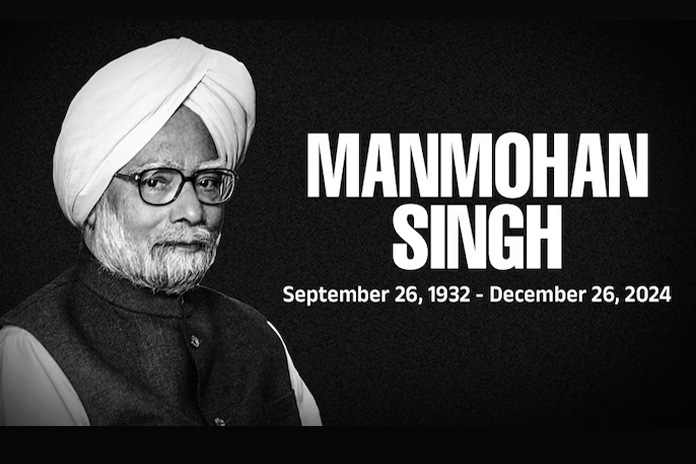New Delhi: Dr. Manmohan Singh, India’s former Prime Minister and a key architect of the country’s liberalised economy, passed away on Thursday at the age of 92. Singh, who had been under treatment at the All India Institute of Medical Sciences (AIIMS) in New Delhi for age-related ailments, leaves behind a towering legacy of economic reforms, integrity, and quiet statesmanship.
Dr Manmohan Singh served as prime minister of India from 2004 to 2014. “With profound grief, we inform the demise of the former Prime Minister of India, Dr Manmohan Singh, aged 92. He was being treated for age-related medical conditions and had a sudden loss of consciousness at home on 26 December 2024.
Resuscitative measures were started immediately at home. He was brought to the Medical Emergency at AIIMS, New Delhi at 8:06 PM. Despite all efforts, he could not be revived and was declared dead at 9:51 PM,” the AIIMS said in a statement.
Born on September 26, 1932, in Gah, Punjab (now in Pakistan), Singh’s life mirrored the tumult of India’s modern history. Partition uprooted his family in 1947, and they settled in India as refugees. Despite humble beginnings, Singh emerged as a brilliant scholar, earning accolades at Panjab University, the University of Cambridge, and the University of Oxford, where he completed a doctorate in economics.
His journey from academia to public service began in the early 1970s when he joined the Ministry of Commerce and Industry as an Economic Advisor. His tenure as Finance Minister in 1991 under P.V. Narasimha Rao proved to be a watershed moment for India. Facing a severe balance-of-payments crisis, Singh spearheaded economic reforms that dismantled decades of protectionist policies, opening India to global markets.
With his signature calm demeanor, Singh presented the new economic vision, famously declaring in Parliament, “No power on earth can stop an idea whose time has come.”
In 2004, Singh took on the mantle of Prime Minister, becoming the first Sikh to hold the office. His two terms were marked by significant achievements, including the Indo-US nuclear deal, unprecedented economic growth, and the rollout of progressive schemes like MNREGA and RTI. Despite political controversies in his later years, Singh remained a respected figure for his personal integrity.
Leaders from across the political spectrum have paid tributes to Singh. Prime Minister Narendra Modi described him as a “visionary economist and statesman,” while Congress leader Sonia Gandhi called him the “gentlest and most honorable voice in Indian politics.”
Dr. Singh is survived by his wife, Gursharan Kaur, and their three daughters. His life, a blend of scholarly brilliance and political stewardship, stands as a testament to India’s potential for transformation and resilience.
The nation mourns the passing of one of its finest leaders, whose contributions will continue to shape India’s future. Funeral arrangements are being finalised, with dignitaries and citizens expected to pay their last respects in New Delhi.










